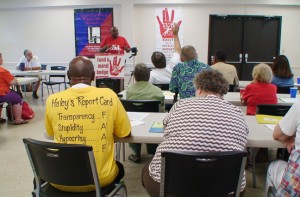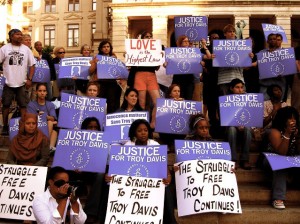By Margaret Newkirk and Frank Bass
Oct. 11 (Bloomberg) — Nineteen years ago, when BMW announced a new factory off Interstate 85 in Spartanburg, South Carolina looked like the king of smokestack recruiting.
The world’s biggest manufacturer of luxury vehicles would make the city a “Mecca of foreign investment in the United States,” The Independent of London predicted. It would see a rush of industry chasing Munich-based Bayerische Motoren Werke AG. Downtown would spring to life. I-85 would be America’s Autobahn.
“Oh, they were going to solve all of our problems,” said Cynthia Lounds, director of community economic development at Piedmont Community Actions Inc., a social-service agency.
Today, South Carolina is one of the most impoverished states in the nation, becoming the seventh poorest in 2010 from 11th in 2007, according to recent U.S. Census data. Its percentage of residents living in poverty shot to 18.2 percent from 15 percent in that period. In downtown Spartanburg, near- empty Morgan Square features a used clothing store and two pawn shops.
South Carolina and other southern U.S. states topped the nation’s poverty rankings, a sign of trouble in the so-called New South known for its growth and ability to lure employers with laws restricting union organizing. The South was the country’s only region with an increase from 2009 to 2010 in both the number of poor and their proportion of the population, the census said.
‘Downward Pressure on Wages’
The numbers show that even as South Carolina trumpeted coups like BMW, the state’s stance toward organized labor has depressed living standards, said Chris Kromm, executive director of the Institute for Southern Studies in Durham, North Carolina.
“There’s been this kind of undertow of low-wage jobs all along,” Kromm said. “There have been successes in luring industries, there’s no question about that. But it brought an overall downward pressure on wages.”
Job creation is at the center of the 2012 presidential campaign. South Carolina on Jan. 21 will play a key role as host to the first Southern primary in the race to select President Barack Obama’s Republican challenger.
The effect of right-to-work laws on wages has been the subject of intense debate for years. The National Right to Work Committee, for instance, says that employee compensation rose faster in states with those laws, according to the organization’s website.
Boeing Battle
South Carolina’s rising poverty rate coincides with a dispute over expansion of a Boeing Co. plant in North Charleston. The National Labor Relations Board sued Boeing Co. over its decision to locate a 4,000-job factory there, saying the move was intended to punish union activity at its base in Washington State.
“It’s like the Obama administration can’t come up with anything else to stifle business growth in this state,” said Lewis Gossett, president of the South Carolina Manufacturers Alliance.
Hostility to organized labor was at the core of the region’s strategy for attracting jobs: South Carolina joined the ranks of right-to-work states in 1954, outlawing contracts that require union membership or dues, according to the U.S. Department of Labor.
‘Come on Down!’
The state marketed its non-union labor in the unionized North, said Brett Bursey, executive director of the SC Progressive Network, an activist group based in Columbia. One industry recruiting poster from the 1980s, he said, showed a man in a T-shirt and a swelling belly. “South Carolina has no labor pains,” it read. “Come on down!”
The fight over Chicago-based Boeing’s efforts to expand in North Charleston has revived the issue. With the state’s unemployment rate at 11.1 percent in August, compared with 9.1 percent nationwide, even some critics of the state’s labor stance want the Boeing plant to stay open.
“There’s not a lot of debate about that around here,” said Joseph Darby, a pastor of Morris Brown AME Church in Charleston who criticized what he said is the state’s emphasis on low-skill work over education. “The area is so starved for jobs.”
Like much of the Southeast, South Carolina lost construction employment during the recession. Its textile industry continued to bleed jobs as well: Union County, about 20 miles from Spartanburg, had the state’s fourth-highest unemployment rate after a sock factory and a mill closed in 2009 and 2010. The county also lost a 150-job Disney distribution warehouse it had lured from Memphis 12 years earlier with tax breaks. Disney moved the operation back to Tennessee in July.
Warehouse Work
“I’m just waiting to see what God has in store for me,” said Joan Bobo, 49, who worked at the facility since it opened. “I’m experienced in warehouse work. I haven’t found anything yet.”
South Carolina has seen good business news in the past year. Manufacturing employment in August was up 11,000 jobs from a year earlier, including 1,600 new jobs at BMW. The state beat out North Carolina for a Continental Tire company factory on Oct. 6. It’s getting an Amazon distribution center near Columbia.
BMW’s South Carolina plant directly and indirectly supported 23,050 jobs in 2007 and 2008, generating $1.2 billion in wages, according to a study by the Moore School of Business at the University of South Carolina in Columbia. The automaker’s direct employees at the plant accounted for 2.2 percent of the state’s manufacturing employment, the study said.
Expectations ‘Exceeded’
“Since announcing our BMW operations in South Carolina in 1992, and beginning production in 1994, our expectations have continually been exceeded,” Max Metcalf, a spokesman, said in an e-mail.
Some of the new jobs in the state, though, have carried a downside. Employers began hiring through staffing agencies, instead of directly. The jobs were temporary and lower paid than permanent positions. At BMW, the difference was $15 per hour compared with $15.50, Metcalf said. The company needs the flexibility to respond to demand, he said, and recently moved many temporary workers to permanent status.
While South Carolina’s private businesses have added employment, the state lost 15,700 government positions in the year ending in August.
Juanita Dixon, 33, lost her seven-year government job in February. A community-college graduate and mother of two, Dixon earned $10.25 an hour, paid vacation and insurance as a medical assistant at a county rehabilitation center. Budget cuts closed it, she said in a phone interview.
Five Applications Daily
Dixon put in five job applications daily, she said. When BMW’s staffing contractor held a job fair at a hotel, she applied and was told the wage was $13 an hour.
She passed a written test, but failed a physical one. “You have to put tires on a car, and you have to do so many in so much time,” Dixon said. “They said, ‘You can reapply in a year.’”
Dixon now works at Spartanburg’s new Adidas Distribution Center, earning $9 an hour doing factory warehouse work. She got the job through a staffing agency in September: “It’s a temporary job for three months,” she said.
When BMW arrived in the city, the look of the place was transformed, said Lounds, of Piedmont Community Actions. Factory workers tooled around town in cars bought with employee discounts.
“There were more BMWs around here than Fords,” she said.
Drawn by BMW
Out on I-85, BMW now employs 7,000, nearly twice the 4,000 promised in the 1990s, said Metcalf, the spokesman. The automaker attracted more than 40 suppliers to the state, spurred investment in the Port of Charleston and invested $750 million during the recession in Spartanburg, which now has 277,916 people, according to the census.
Yet the I-85 “autobahn” of industry didn’t materialize, said Holly Ulrich, senior scholar at the Strom Thurmond Institute of Government and Public Affairs at Clemson University.
“Those predictions were made during the boom years for South Carolina and the South, before a series of national economic catastrophes,” Ulrich said. “I haven’t seen evidence that it happened.”
On Sept. 27, five days after the census poverty numbers were released, the first-term Republican governor, Nikki Haley, tried to boost morale. She ordered state workers to change the way they answered the phone.
By the next morning, callers to an unemployment office in Spartanburg heard the new message: ‘It’s a great day in South Carolina.”
–Editors: Flynn McRoberts, Stephen Merelman
To contact the reporters on this story: Margaret Newkirk in Atlanta at mnewkirk@bloomberg.net; Frank Bass in Washington at fbass1@bloomberg.net. To contact the editor responsible for this story: Mark Tannenbaum at mtannen@bloomberg.net.


